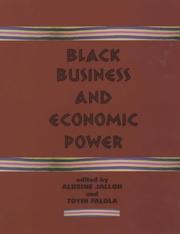| Listing 1 - 9 of 9 |
Sort by
|
Book
ISBN: 1280364173 9786610364176 0471436895 Year: 2001 Publisher: New York : John Wiley,
Abstract | Keywords | Export | Availability | Bookmark
 Loading...
Loading...Choose an application
- Reference Manager
- EndNote
- RefWorks (Direct export to RefWorks)
Learn and be inspired by the fascinating true stories behind 10 leading lights in black enterprise today . . .* While she won't share the formulas for her world-renowned hot sauces, Vivian Gibson, CEO of The MillCreek Company, is glad to impart her recipe for transforming a passion for cooking into a multimillion-dollar enterprise.* He went from sleeping in Central Park to heading a major film production and syndication company. Get the details on how Frank Mercado-Valdes's love of classic black films led to the creation of the African Heritage Network. * At only 34 years old, Alon
Businesspeople --- Entrepreneurship --- Business enterprises, Black.

ISBN: 158046114X Year: 2002 Publisher: Rochester (N. Y.) : University of Rochester press,
Abstract | Keywords | Export | Availability | Bookmark
 Loading...
Loading...Choose an application
- Reference Manager
- EndNote
- RefWorks (Direct export to RefWorks)
Blacks --- Business enterprises, Black --- Economic conditions --- History --- Management
Book
ISBN: 180043927X Year: 2020 Publisher: [Place of publication not identified] : Emerald Publishing Limited,
Abstract | Keywords | Export | Availability | Bookmark
 Loading...
Loading...Choose an application
- Reference Manager
- EndNote
- RefWorks (Direct export to RefWorks)
Business enterprises, Black --- African American business enterprises --- Management.
Book
ISBN: 1869225856 1869225864 9781869225865 9781869225858 Year: 2016 Publisher: Randburg, Republic of South Africa
Abstract | Keywords | Export | Availability | Bookmark
 Loading...
Loading...Choose an application
- Reference Manager
- EndNote
- RefWorks (Direct export to RefWorks)
Business enterprises, Black --- Blacks --- Economic development --- Business enterprises, Black. --- Black business enterprises --- Negroes --- Ethnology --- Economic conditions. --- Economic conditions --- E-books --- Black persons --- Black people
Book
Year: 2001 Publisher: [Washington, D.C.] : U.S. Census Bureau,
Abstract | Keywords | Export | Availability | Bookmark
 Loading...
Loading...Choose an application
- Reference Manager
- EndNote
- RefWorks (Direct export to RefWorks)
Book
ISBN: 1626740089 Year: 2014 Publisher: Jackson, Mississippi : University Press of Mississippi,
Abstract | Keywords | Export | Availability | Bookmark
 Loading...
Loading...Choose an application
- Reference Manager
- EndNote
- RefWorks (Direct export to RefWorks)
An extraordinary history of the negro leagues and the economic disruptions of desegregating a sport
Negro leagues --- Business enterprises, Black --- Discrimination in sports --- Economic aspects. --- History
Book
ISBN: 9766376360 9789766376369 Year: 2013 Publisher: Kingston Miami
Abstract | Keywords | Export | Availability | Bookmark
 Loading...
Loading...Choose an application
- Reference Manager
- EndNote
- RefWorks (Direct export to RefWorks)
Businesspeople --- Businesspeople, Black --- Business enterprises, Black --- Montserratians --- Immigrants --- Emigrants --- Foreign-born population --- Foreign population --- Foreigners --- Migrants --- Persons --- Aliens --- Ethnology --- Black business enterprises --- Black businesspeople --- Wade, Tony. --- Wade, Antonio --- Wade, Harold --- E-books
Book
ISBN: 1920596445 9781920596446 1920596437 9781920596439 Year: 2018 Publisher: Baltimore, Maryland : Baltimore, Md. : Project Muse, Project MUSE,
Abstract | Keywords | Export | Availability | Bookmark
 Loading...
Loading...Choose an application
- Reference Manager
- EndNote
- RefWorks (Direct export to RefWorks)
Small businesses owned by international migrants and refugees are often the target of xenophobic hostility and attack in South Africa. This report examines the problematization of migrant-owned businesses in South Africa, and the regulatory efforts aimed at curtailing their economic activities. In so doing, it sheds light on the complex ways in which xenophobic fears are generated and manifested in the country's social, legal and political orders. Efforts to curb migrant spaza shops in South Africa have included informal trade agreements at local levels, fining migrant shops, and legislation that prohibits asylum seekers from operating businesses in the country. Several of these interventions have overlooked the content of local by-laws and outed legal frameworks. The report concludes that when South African township residents attack migrant spaza shops, they are expressing their dissatisfaction with their socio-economic conditions to an apprehensive state and political leadership. In response, governance actors turn on migrant shops to demonstrate their allegiance to these residents, to appease South African spaza shopkeepers, and to tacitly blame socio-economic malaise on perceived foreign forces. Overall, these actors do not have spaza shops primarily in mind when calling for the stricter regulation of these businesses. Instead, they are concerned about the volatile support of their key political constituencies and how this backing can be undermined or generated by the symbolic gesture of regulating the foreign shop.
Immigrants --- Business enterprises, Black --- Home-based businesses --- Informal sector (Economics) --- Hidden economy --- Parallel economy --- Second economy --- Shadow economy --- Subterranean economy --- Underground economy --- Artisans --- Economics --- Small business --- Business enterprises, Home --- Businesses, Home --- Home businesses --- Self-employed --- Black business enterprises --- Emigrants --- Foreign-born population --- Foreign population --- Foreigners --- Migrants --- Persons --- Aliens --- Immigrant business enterprises --- Xenophobia --- Zenophobia --- Phobias --- Immigrant-owned business enterprises --- Business enterprises --- Economic conditions --- E-books
Book
ISBN: 1770909931 177090994X 1770413782 Year: 2017 Publisher: Toronto, Ontario : ECW,
Abstract | Keywords | Export | Availability | Bookmark
 Loading...
Loading...Choose an application
- Reference Manager
- EndNote
- RefWorks (Direct export to RefWorks)
Civil rights workers --- Business enterprises, Black --- Jamaicans --- Blacks --- Radio stations --- Radio --- Radio broadcasting --- Stations, Radio --- Negroes --- Ethnology --- Black business enterprises --- Civil rights activists --- Race relations reformers --- Social reformers --- Social conditions. --- Stations --- Transmitters and transmission --- Jolly, B. Denham. --- Flow FM (Radio station : Toronto, Ont.) --- Black persons --- Black people
| Listing 1 - 9 of 9 |
Sort by
|

 Search
Search Feedback
Feedback About UniCat
About UniCat  Help
Help News
News